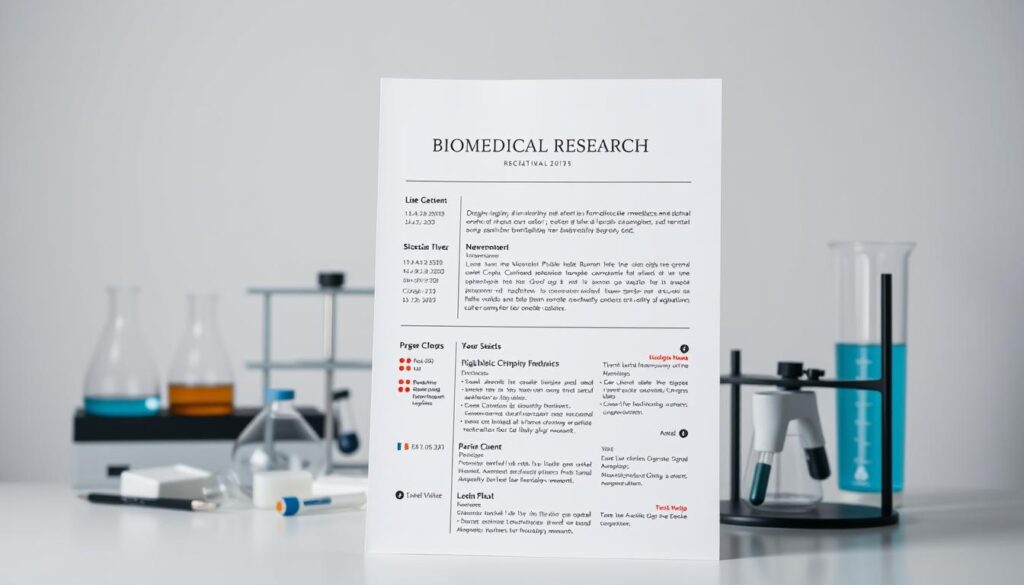Only 3.5% of science PhD holders secure permanent academic research positions – a statistic that shocks many aspiring biomedical researchers. This ultra-competitive field demands more than lab skills and academic credentials. Whether you’re pursuing biology-focused careers in academia or industry, strategic preparation separates successful candidates from the 96.5% who don’t reach their goals.
The biomedical science landscape offers two primary paths: 4-6 year PhD programs focusing on biological processes, or 10+ year medical degrees for clinical research. Industry roles prioritize treatment development, while academic positions require mastery of lab techniques and data analysis. Both demand specific skills rarely taught in classrooms.
This guide reveals seven evidence-based strategies to navigate 2025’s job market. You’ll learn to position your training effectively, whether analyzing human body functions in university labs or evaluating therapies at pharmaceutical companies. We’ll show how tools like RoboApply’s automated application suite streamline the process – particularly valuable when strategic preparation determines career outcomes.
Key Takeaways
- Academic research roles require different preparation than industry positions
- PhD programs take 4-6 years vs. 10+ years for medical research pathways
- Only 20% of science graduates work in research-related roles
- Industry focuses on treatment development, academia on biological processes
- Specialized tools can triple application success rates
Understanding the Biomedical Research Career Path
Your journey begins with foundational coursework in biology, chemistry, or related fields. These undergraduate studies form the bedrock for advanced biomedical science training. Early lab exposure through structured programs helps cement theoretical knowledge into practical skills.
Educational Journey and Lab Experience
Undergraduate research programs like REUs offer paid opportunities to conduct experiments alongside seasoned scientists. These experiences help you:
- Master basic lab techniques like PCR and cell culture
- Develop critical thinking through data analysis
- Build professional networks through lab collaborations
Graduate school presents a critical choice: 2-year master’s programs with thesis requirements versus 4-6 year PhD tracks. PhD candidates complete lab rotations to find ideal mentors – a process that shapes your entire career path.
Exploring Academic and Industry Opportunities
Postdoctoral training bridges education and professional roles. Working in new labs expands your technical repertoire while clarifying career preferences. Academic positions focus on fundamental discoveries about the human body, while industry roles prioritize therapeutic development.
“Industry teams move faster from discovery to application, while academia digs deeper into biological mechanisms.”
Those drawn to applied research might explore biostatistics roles in pharmaceutical companies. Academic researchers often balance lab work with grant writing and mentorship responsibilities.
Building a Standout Resume for Biomedical Research

Your resume serves as your scientific handshake in this competitive field. Top institutions receive 200+ applications per opening, making strategic presentation of your research credentials essential. Start by reverse-engineering job descriptions from target medical researcher resume templates to identify priority skills.
Highlighting Your Research Experience and Education
Lead with degree classifications from respected programs – 78% of hiring managers filter candidates by academic pedigree first. List publications using impact-focused formatting:
- Bold journal names like Nature or Cell
- Specify author position and citation counts
- Group technical skills using industry-standard terminology
Quantify achievements: “Developed PCR protocol reducing processing time by 40%” outperforms vague descriptions. For collaborative projects, clarify your specific contributions to experiments.
Utilizing RoboApply's AI Resume Builder and Grammar Checker
RoboApply’s AI tools transform raw data into compelling narratives. The platform automatically:
- Formats publications for maximum visual impact
- Aligns skills with job-specific keywords
- Flags inconsistent verb tenses or passive voice
Its grammar checker ensures precision – critical when describing complex laboratory procedures. The tool also suggests strategic placements for references from notable scientists, increasing credibility through association.
Tailor each resume using the platform’s industry/academic templates. Clinical roles emphasize FDA compliance experience, while academic positions highlight grant writing and mentorship capabilities. Always include programming languages and statistical methods in a dedicated technical section.
How to Land a Biomedical Researcher Job in 2025
ATS filters eliminate 75% of applications before human review begins. Crafting materials that balance technical depth with algorithmic compatibility separates successful candidates. Start with your cover letter – it’s your first chance to demonstrate alignment with the role’s core requirements.
Tailoring Your Cover Letter to Pass ATS Filters
Focus on research outcomes rather than general skills. For industry roles, highlight experience with treatment development pipelines. Academic positions require clear examples of independent lab work. Use professional scientist cover letter templates to structure achievements effectively.
Match 6-8 keywords from the job description verbatim. Include field-specific terminology like “preclinical trials” or “gene expression analysis.” Avoid creative formatting – simple headers and bullet points improve ATS parsing accuracy.
Optimizing Keywords and Phrases for Job Applications
Prioritize action verbs tied to science workflows: “designed,” “validated,” “optimized.” Industry roles value terms like “GMP compliance” or “protocol standardization.” Academic searches favor “peer-reviewed publications” and “grant writing.”
Use tools like RoboApply’s ATS checker to test keyword density. Balance technical jargon with plain-language explanations of your work’s impact. Remember – human reviewers see surviving applications, so maintain natural phrasing while hitting algorithmic targets.
Final applications should showcase both your expertise and your understanding of the field’s evolving needs. Pair optimized documents with prepared work samples to demonstrate hands-on competence during interviews.
FAQ
What degree do I need to become a biomedical researcher?
Most roles require a bachelor’s degree in biology, chemistry, or related fields for entry-level lab positions. Advanced roles like lead researcher or principal investigator typically demand a Ph.D. or MD-Ph.D. Postdoctoral training strengthens competitiveness for academic or industry roles.
How can I make my resume stand out for biomedical research jobs?
Focus on quantifiable achievements in lab work, like specific experiments or publications. Use RoboApply’s AI Resume Builder to align your skills with job descriptions and optimize keywords like “cell culture” or “data analysis.” Highlight grants, certifications, and technical equipment proficiency.
What skills are critical for success in biomedical research careers?
Technical lab skills (PCR, microscopy), data interpretation, and statistical software expertise are essential. Soft skills like problem-solving, collaboration, and scientific communication are equally vital. Industry roles often value project management or regulatory knowledge.
Should I pursue academia or industry for biomedical research jobs?
Academia offers autonomy in research focus but involves grant writing and teaching. Industry roles prioritize product development with structured workflows and higher pay. Consider internships or rotational programs to test both paths before committing.
How do I prepare for a biomedical researcher interview?
Expect technical questions about your experiments, data analysis methods, and problem-solving scenarios. Practice explaining complex concepts clearly. Research the lab’s recent publications and prepare thoughtful questions about their current projects.
Are internships necessary for landing biomedical research roles?
Yes—lab internships or graduate fellowships provide hands-on experience with equipment like flow cytometers or CRISPR tools. They demonstrate practical skills and help build professional networks, which are critical for referrals in this competitive field.
How important are publications for biomedical research careers?
Publications in peer-reviewed journals validate your expertise and are crucial for academic roles. For industry positions, patents or collaborative projects may carry equal weight. Include preprints or conference presentations if formal publications are limited.


















